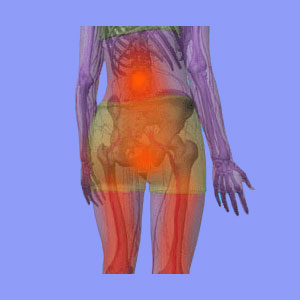
Sciatica sexual dysfunction adds a new level of suffering to an already horrific set of torturous symptoms. Although relatively common to some degree, sexual dysfunction is one of the least discussed of all lower back pain complications, due to its sensitive and often embarrassing nature.
It is a sad statistic that most affected patients will not mention sexual dysfunction to their physicians when seeking treatment for sciatica. However, the time to endure this additional burden in silence has come to an end.
This essay sheds light on a crucial topic for mindbody health: How to enjoy a safe and satisfying love-life, despite being affected by the ravages of sciatica. To this end, we will detail why sexual dysfunction can occur, in association with sciatica, and what can be done to counteract its negative effects on mind and body.
What is Sexual Dysfunction?
Sexual dysfunction is defined as a change in the ability to actually perform sex or the ability to enjoy the sex act. Therefore, included in the definition are symptoms that impair actual functionality, as well as symptoms which prevent pleasure from sexual relations. Sciatica sexual dysfunction can affect men and women alike.
In men, dysfunction can include the inability to achieve an erection (ED). Symptoms may also include the inability to attain an orgasm. Many men suffer a different kind of dysfunction, where all bodily systems function fine, yet sex is still painful and therefore avoided.
In women, symptoms can include the inability to become aroused or the inability to actually feel pleasure from sexual acts. In much the same manner as men, many women find sexual acts to be painful and are also therefore arduously avoided.
Sexual dysfunction must be included with a patient’s symptomatic details and should be actively discussed with both diagnosticians and treatment providers alike. If not, sexual symptoms may not resolve, despite the improvement in the overall sciatica condition.
What Causes Sciatica Sexual Dysfunction?
Sexual dysfunction, like most other health conditions, can occur due to exclusively physical problems with the anatomy, psychological problems in the mind or a combination of both contributing factors working together in terrible harmony. The following factors are primary causes of sexual dysfunction in relation to sciatic nerve symptoms:
The structural contributor to sciatica-related sexual dysfunction usually revolves around nerve compression of the cauda equina nerve roots in the central canal, due to spinal stenosis. This process can cause sciatica, but can also affect the viability of the lower sacral nerves, before they exit through their designated neuroforamen. These nerves are responsible for providing many of the anatomical changes associated with sexual response.
Neurological compression can occur from arthritic changes, intervertebral protrusion, atypical spinal curvature or other possible reasons. Regardless of the cause, when compressed, these nerves can not function and sexual dysfunction will likely ensue.
Ischemia of the cauda equina can also cause sciatica and sexual dysfunction to occur simultaneously. Purposeful oxygen deprivation is a very common mindbody condition that can strike anywhere in the anatomy. When the ischemic effect targets these vital nerves, widespread and agonizing symptoms may result.
Secondary causes of sexual dysfunction include the incidence of pain when performing sexually, for both men and women. It is virtually impossible to be interested in sex, or perform, when a person is in dire pain. Some patients suffer position-specific symptoms, while others can not enjoy any sexual stimulation at all.
Another secondary cause of sexual dysfunction is the psychological overlay of pain. While sex itself might not be painful, patients who suffer chronic sciatica symptoms can become depressed, disinterested in life and emotionally disengaged from their partners. These causes are extremely serious and must be addressed in order to prevent serious permanent interpersonal damage between bonded individuals in a relationship.
Sciatica Sexual Dysfunction Helpful Suggestions
Sex is an important part of life. Being deprived of the joy of sex is just another suffering endured by sciatica patients. However, there is help available. Be sure to discuss all symptoms with your doctor. Do not conveniently leave sexual symptoms out of the conversation, in order to save yourself some embarrassment. Treatment can only be directed successfully once a problem has been positively identified. The first step is to confront the issue and get it out in the open. Trust us; you will feel much better once this has been accomplished.
Next, open your mind to all possible causes and solutions for your problem. Do not allow yourself to suffer needlessly by denying psychoemotional contributors to the problem. Likewise, do not force yourself, or your partner, to suffer needlessly by failing to embrace all the potential solutions to the sexual dysfunction concern, including highly effective psychoemotional remedies.
Hopefully, with time, patience and targeted treatment, sexual dysfunction will disappear, along with the sciatica that made your life a torment for so long. For further information, speak to your doctor for personalized advice and therapy recommendations.






